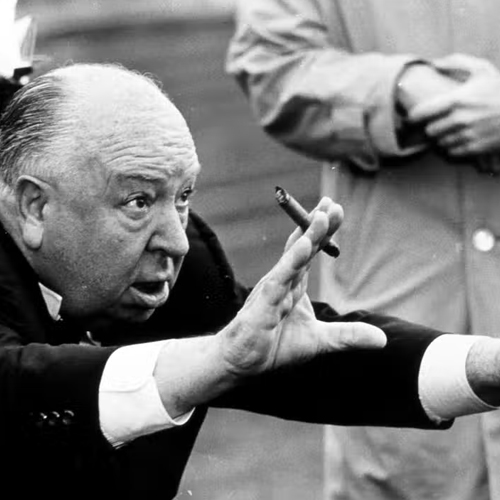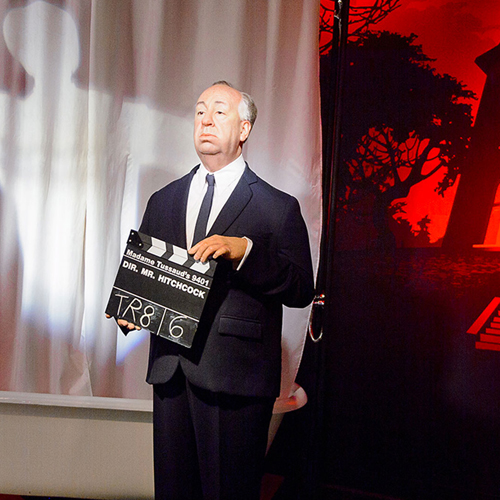
Alfred Hitchcock
Born: 13 August 1899
Died: 29 April 1980 (80 Years)
Cause: He died of kidney failure the following month, on 29 April, in his Bel Air home.
Died: 29 April 1980 (80 Years)
Cause: He died of kidney failure the following month, on 29 April, in his Bel Air home.

Alfred Hitchcock

Alfred Hitchcock
Sir Alfred Joseph Hitchcock KBE (13 August 1899 – 29 April 1980) was an English filmmaker widely regarded as one of the most influential figures in the history of cinema. In a career spanning six decades, he directed over 50 feature films, many of which are still widely watched and studied today. Known as the "Master of Suspense", he became as well known as any of his actors thanks to his many interviews, his cameo roles in most of his films, and his hosting and producing the television anthology Alfred Hitchcock Presents (1955–65). His films garnered 46 Academy Award nominations, including six wins, although he never won the award for Best Director despite five nominations.
Hitchcock initially trained as a technical clerk and copy writer before entering the film industry in 1919 as a title card designer. His directorial debut was the British-German silent film The Pleasure Garden (1925). His first successful film, The Lodger: A Story of the London Fog (1927), helped to shape the thriller genre, and Blackmail (1929) was the first British "talkie". His thrillers The 39 Steps (1935) and The Lady Vanishes (1938) are ranked among the greatest British films of the 20th century. By 1939, he had international recognition and producer David O. Selznick persuaded him to move to Hollywood. A string of successful films followed, including Rebecca (1940), Foreign Correspondent (1940), Suspicion (1941), Shadow of a Doubt (1943), and Notorious (1946). Rebecca won the Academy Award for Best Picture, with Hitchcock nominated as Best Director; he was also nominated for Lifeboat (1944) and Spellbound (1945). After a brief commercial lull, he returned to form with Strangers on a Train (1951) and Dial M for Murder (1954); he then went on to direct four films often ranked among the greatest of all time: Rear Window (1954), Vertigo (1958), North by Northwest (1959) and Psycho (1960), the first and last of these garnering him Best Director nominations. The Birds (1963) and Marnie (1964) were also financially successful and are highly regarded by film historians.
The "Hitchcockian" style includes the use of editing and camera movement to mimic a person's gaze, thereby turning viewers into voyeurs, and framing shots to maximise anxiety and fear. The film critic Robin Wood wrote that the meaning of a Hitchcock film "is there in the method, in the progression from shot to shot. A Hitchcock film is an organism, with the whole implied in every detail and every detail related to the whole." Hitchcock made multiple films with some of the biggest stars in Hollywood, including four with Cary Grant in the 1940s and 1950s, three with Ingrid Bergman in the last half of the 1940s, four with James Stewart over a ten-year span commencing in 1948, and three with Grace Kelly in the mid-1950s. Hitchcock became an American citizen in 1955.
In 2012, Hitchcock's psychological thriller Vertigo, starring Stewart, displaced Orson Welles' Citizen Kane (1941) as the British Film Institute's greatest film ever made based on its world-wide poll of hundreds of film critics. As of 2021, nine of his films had been selected for preservation in the United States National Film Registry, including his personal favourite, Shadow of a Doubt (1943). He received the BAFTA Fellowship in 1971, the AFI Life Achievement Award in 1979 and was knighted in December that year, four months before his death on 29 April 1980.
Toward the end of his life, Hitchcock was working on the script for a spy thriller, The Short Night, collaborating with James Costigan, Ernest Lehman and David Freeman. Despite preliminary work, it was never filmed. Hitchcock's health was declining and he was worried about his wife, who had suffered a stroke. The screenplay was eventually published in Freeman's book The Last Days of Alfred Hitchcock (1999).
Having refused a CBE in 1962, Hitchcock was appointed a Knight Commander of the Most Excellent Order of the British Empire (KBE) in the 1980 New Year Honours. He was too ill to travel to London—he had a pacemaker and was being given cortisone injections for his arthritis—so on 3 January 1980 the British consul general presented him with the papers at Universal Studios. Asked by a reporter after the ceremony why it had taken the Queen so long, Hitchcock quipped, "I suppose it was a matter of carelessness." Cary Grant, Janet Leigh, and others attended a luncheon afterwards.
His last public appearance was on 16 March 1980, when he introduced the next year's winner of the American Film Institute award. He died of kidney failure the following month, on 29 April, in his Bel Air home. Donald Spoto, one of Hitchcock's biographers, wrote that Hitchcock had declined to see a priest, but according to Jesuit priest Mark Henninger, he and another priest, Tom Sullivan, celebrated Mass at the filmmaker's home, and Sullivan heard his confession. Hitchcock was survived by his wife and daughter. His funeral was held at Good Shepherd Catholic Church in Beverly Hills on 30 April, after which his body was cremated. His remains were scattered over the Pacific Ocean on 10 May 1980.
(wikipedia)
Hitchcock initially trained as a technical clerk and copy writer before entering the film industry in 1919 as a title card designer. His directorial debut was the British-German silent film The Pleasure Garden (1925). His first successful film, The Lodger: A Story of the London Fog (1927), helped to shape the thriller genre, and Blackmail (1929) was the first British "talkie". His thrillers The 39 Steps (1935) and The Lady Vanishes (1938) are ranked among the greatest British films of the 20th century. By 1939, he had international recognition and producer David O. Selznick persuaded him to move to Hollywood. A string of successful films followed, including Rebecca (1940), Foreign Correspondent (1940), Suspicion (1941), Shadow of a Doubt (1943), and Notorious (1946). Rebecca won the Academy Award for Best Picture, with Hitchcock nominated as Best Director; he was also nominated for Lifeboat (1944) and Spellbound (1945). After a brief commercial lull, he returned to form with Strangers on a Train (1951) and Dial M for Murder (1954); he then went on to direct four films often ranked among the greatest of all time: Rear Window (1954), Vertigo (1958), North by Northwest (1959) and Psycho (1960), the first and last of these garnering him Best Director nominations. The Birds (1963) and Marnie (1964) were also financially successful and are highly regarded by film historians.
The "Hitchcockian" style includes the use of editing and camera movement to mimic a person's gaze, thereby turning viewers into voyeurs, and framing shots to maximise anxiety and fear. The film critic Robin Wood wrote that the meaning of a Hitchcock film "is there in the method, in the progression from shot to shot. A Hitchcock film is an organism, with the whole implied in every detail and every detail related to the whole." Hitchcock made multiple films with some of the biggest stars in Hollywood, including four with Cary Grant in the 1940s and 1950s, three with Ingrid Bergman in the last half of the 1940s, four with James Stewart over a ten-year span commencing in 1948, and three with Grace Kelly in the mid-1950s. Hitchcock became an American citizen in 1955.
In 2012, Hitchcock's psychological thriller Vertigo, starring Stewart, displaced Orson Welles' Citizen Kane (1941) as the British Film Institute's greatest film ever made based on its world-wide poll of hundreds of film critics. As of 2021, nine of his films had been selected for preservation in the United States National Film Registry, including his personal favourite, Shadow of a Doubt (1943). He received the BAFTA Fellowship in 1971, the AFI Life Achievement Award in 1979 and was knighted in December that year, four months before his death on 29 April 1980.
Toward the end of his life, Hitchcock was working on the script for a spy thriller, The Short Night, collaborating with James Costigan, Ernest Lehman and David Freeman. Despite preliminary work, it was never filmed. Hitchcock's health was declining and he was worried about his wife, who had suffered a stroke. The screenplay was eventually published in Freeman's book The Last Days of Alfred Hitchcock (1999).
Having refused a CBE in 1962, Hitchcock was appointed a Knight Commander of the Most Excellent Order of the British Empire (KBE) in the 1980 New Year Honours. He was too ill to travel to London—he had a pacemaker and was being given cortisone injections for his arthritis—so on 3 January 1980 the British consul general presented him with the papers at Universal Studios. Asked by a reporter after the ceremony why it had taken the Queen so long, Hitchcock quipped, "I suppose it was a matter of carelessness." Cary Grant, Janet Leigh, and others attended a luncheon afterwards.
His last public appearance was on 16 March 1980, when he introduced the next year's winner of the American Film Institute award. He died of kidney failure the following month, on 29 April, in his Bel Air home. Donald Spoto, one of Hitchcock's biographers, wrote that Hitchcock had declined to see a priest, but according to Jesuit priest Mark Henninger, he and another priest, Tom Sullivan, celebrated Mass at the filmmaker's home, and Sullivan heard his confession. Hitchcock was survived by his wife and daughter. His funeral was held at Good Shepherd Catholic Church in Beverly Hills on 30 April, after which his body was cremated. His remains were scattered over the Pacific Ocean on 10 May 1980.
(wikipedia)

